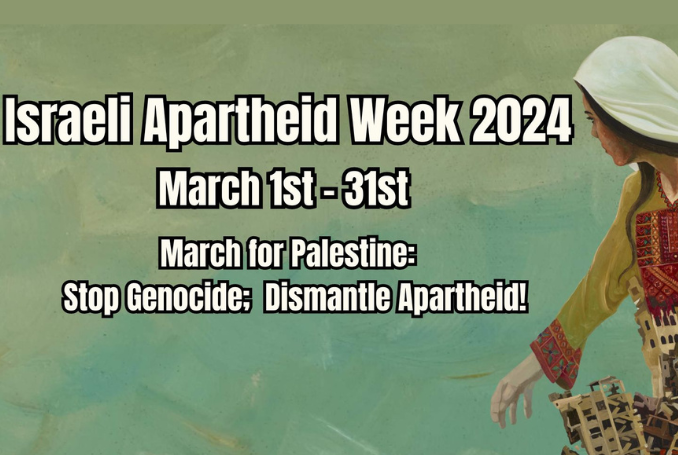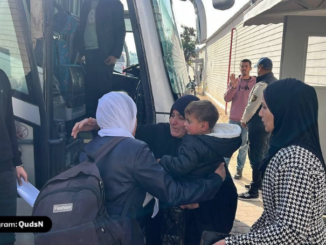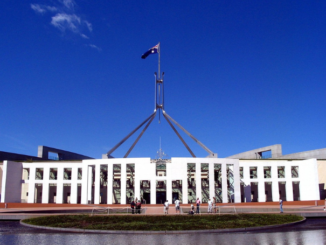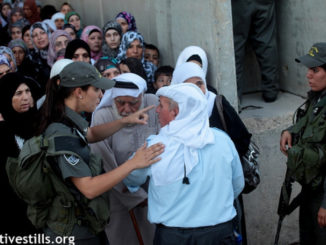
By Benay Blend
The larger problem in which apartheid remains a part is Zionism. For a sustainable peace to exist, Zionism must be dismantled, along with its racist structure.
This year, the Boycott, Divestment, Sanctions Movement (BDS) has extended Israeli Apartheid Week (IAW) over the entire month of March. Labeled the most important IAW since the campaign was launched 20 years ago, this year’s event occurs during a time when Israel is carrying out a live-streamed genocide against the Palestinian people. While Gaza is the main target, Israeli violence has also escalated in the West Bank, aided by settlers who help the state in its raids on local villages.
In 2019, there were at least 200 anti-apartheid events around the world with the prophetic theme “Stop Arming Colonialism.” At the 6th annual BDS conference in Ramallah, Palestine, Ms. Baleka Mbete, speaker of the National Assembly of the Republic of South Africa, delivered the keynote address.
In South Africa, a country that witnessed its own successful anti-apartheid movement, there were dozens of events that highlighted opposition to Israeli apartheid. Comic Mashabela Galane performed in five cities as part of the comedy tour “Apartheid Ain’t Funny.” Ali Abunimah appeared on SABC TV News.
Since October 7th, several well-known brands have reported a decline in sales due to their perceived support of Israel. McDonald’s, Starbucks, Coca-Cola, and Domino’s Pizza, among others, all have seen a noticeable drop in profits.
This year the theme is “March for Palestine: Stop Genocide: Dismantle Apartheid!” Ending apartheid and settler colonialism appear to be the goal, but is that enough given the dire situation now in Gaza? Involved with BDS from its inception, Haidar Eid had already expressed concern about the movement’s limitations.
As a campaign that limits itself to ensuring that the rights of Palestinians are ensured, Eid believes that it is time to create an end-game, a “vision for the political reality within which such rights will be extended.” Indeed, it’s difficult to imagine how Palestinian rights could ever be respected under colonization.
As one tool within the arsenal of means for liberation, BDS is important both as an educational campaign as well as a way to isolate the Zionist state. But it is not an end within itself.
Looking at the histories of South Africa and the American South post-apartheid is instructive. Neither went much beyond simply ending segregation so that the basic structures of oppression remained intact.
In the South, white Southerners lost no time establishing White Citizen’s Council schools that could exclude whoever they didn’t want. Across the nation, these years also saw the beginning of “white flight,” the exodus of white families from the inner city to the suburbs, creating a new form of segregation. More recently, there has been the emergence of “white charter school enclaves— defined as charter schools located in school districts that are thirty percent or less white, but that enroll a student body that is fifty percent or greater white.”
This is not to say that the civil rights movement did not secure some gains, but the leaders and their descendants were siphoned off into the Democratic Party, thereby softening any radical edges that remained.
“Blacks haven’t transformed the Democratic Party by our overwhelming presence,” writes the late Glen Ford, Executive Editor of Black Agenda Report. “Instead, the Party has transformed us – and overwhelmed our radical politics.” The Black Radical Tradition still exists, Ford concluded, but it tends to disappear on national primary election days in the Democratic Party.
In Ford’s view, both parties are the Rich Man’s Party, but only one is the White Man’s Party, though that allegiance shifts back and forth, depending on the times. Historically, Blacks have sought refuge in the party that opposes the latter, which means that they often vote against their own self-interest and ideology.
Nowhere is this more visible than among Black clergy and Congressional members who support the Zionist state of “Israel.” During a Sunday morning service at the MLK Ebenezer Church in Atlanta, Georgia, Senator Ralph Warnock’s sermon was interrupted by a group of students who rose from their pews and slowly walked out, one by one.
Captured in a video on Tik Tok, the students wore t shirts that said “Stop Arming Israel.” “I voted for Raphael Warnock in the first election that I could legally vote in because I thought that he would stand for what’s right but unfortunately I was wrong and he has failed the Palestinian people and the community who voted for him in Atlanta…,” one student claimed.
In New York, Mayor Eric Adams has compared pro-Palestinian protestors to “extremists” who support “terrorism.” Even worse, shortly after October 7th, he clarified his statement: “At a moment when innocent people are being slaughtered and children kidnapped in Israel, it is disgusting that this group of extremists would show support for terrorism. I reject this. New York City rejects this.”
Adams’s notion of New York City leaves out all those who support the Palestinian resistance, and his pity for innocent Israelis leaves out the approximately 500 Palestinians who were murdered as of October 9 by Israeli air strikes. Since October 7, pro-Palestinian protestors have faced increasing repression from the Mayor’s office and NYPD.
A little over a month past October 7th, Suren Pillay, A.C. Jordan Chair in African Studies at the University of Cape Town, wrote a piece for Al Jazeera that predicted Israel would reach a “tipping point,” much like South Africa, in which they might lose the world’s support. “White South Africans realised their apartheid project was unsustainable,” Pillay claimed. “Israelis will, too.”
“As a South African who has lived to cross the Rubicon,” Pillay concluded, “I hope this catastrophe will force Israelis to see that only a just and inclusive political solution based on equal citizenship for all is going to bring them freedom from fear.”
Nevertheless, South Africa’s problems did not end with dismantling the apartheid system. Much like in America, the system has not changed.
“Black capitalism will not free South Africa from imperialism,” Sehlare Makjetlaneng writes. “It will help to cement ties between the South African bourgeoisie and the imperialist bourgeoisie.” Because of failing to nationalize the industries, redistribute the land, or undertake other goals of the Freedom Charter, the African National Congress (ANC) instead created a Black capitalist class while leaving the masses people still poor.
Indeed, as Roger Southall notes, only a minority of South Africans have been admitted to the old order of white elites, leaving the rest of the country mired in poverty. “As many black (and other) commentators point out,” he concludes, “there is as much continuity with apartheid as there has been change.”
This is not to ignore the symbolic importance of South African lawyers bringing a charge of genocide against Israel at the International Court of Justice (ICJ). They understood the violence that Zionists have perpetrated against Palestinians because they underwent the same.
The larger problem in which apartheid remains a part is Zionism, as Dr. Ramzy Baroud explains. One state, two states, none of that matters while the structures of repression do not change. “Reducing all of these issues to that of finding creative political solutions that would merely sell false hopes to the Palestinian people is not only ignorant, or devious,” he writes, “but also a diversion from the real problem: Israel’s ideology of Zionism.”
For a sustainable peace to exist, Zionism must be dismantled, along with its racist structure. Perhaps then Palestinians will have a future different than South Africa and America, as the latter two are still grappling with systemic problems that have not yet been addressed.

– Benay Blend earned her doctorate in American Studies from the University of New Mexico. Her scholarly works include Douglas Vakoch and Sam Mickey, Eds. (2017), “’Neither Homeland Nor Exile are Words’: ‘Situated Knowledge’ in the Works of Palestinian and Native American Writers”. She contributed this article to The Palestine Chronicle.







